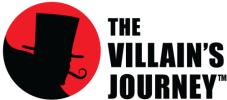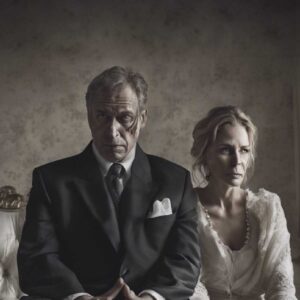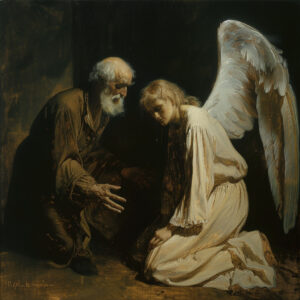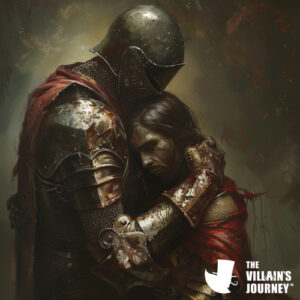I remember the moment I realized I wasn’t the hero in my life’s story. I was deep into the process of destroying two families — maybe three. I never bothered to check on that last one.
As her life unraveled around her, my wife did something so incredibly brave, so unimaginably vulnerable, so unbelievably forgiving, that I could no longer hang onto my belief that I was the victim. So, fuck her for that.
There is a tried and true method for handling a thought like, “Oh, maybe I’m the bad buy here.” Push. It. Down. Double down on blaming others. Distract yourself with anything that you can find laying around. Text your friends who have bought into your story. These all work — have worked — over and over. So, it’s not like I didn’t have some recourse after having this rather distasteful thought.
I chose them all. Did you think I was going to choose something different? Over the next few years my wife — now ex-wife — would continue to be brave, to be heroic. And I would continue to blow shit up. But the thought never left. You may be shocked to learn that I behaved in other relationships the way I have behaved in my marriage. Pick your jaw up off of the floor. But, redemption is not something you seek. Redemption comes for you.
There are only so many broken relationships you can have before you begin to realize the common thread in all of them. You. The old strategies stop working. The friends who once came to your defense grow tired of fighting your battles with you. You strain all of your codependencies. Eventually, you find yourself with no more back doors to sneak out of. You must turn and look at the steaming piles of shit that you’ve left scattered across your life.
“The only way to get to the other side is through the darkness.” I thought this was a fine aphorism for people recovering from trauma, like my ex-wife. But I began to realize that the darkness I had to go through wasn’t out there. It was in me. And there was no avoiding the wreckage I would have to work my way through to get to the other side. Any other side but this.
I leaned into the darkness. I was clearly playing a role in my life and in the life of my wife, my kids, my friends, my neighbors, and of other drivers on the road. How can I understand this role psychologically, philosophically, theologically?
There’s really not a lot of help out there for the shitty people. The heroes get all of the glory. People who are shitty to other people are seen as potential good people who just need a lot of work. Your therapist isn’t so interested in nurturing the amazing skills you’ve developed for turning lives upside down. Once the appropriate childhood traumas have been uncovered, you begin to work on getting rid of them, even though we all know that they never go away.
Heroes, on the other hand, have a storied journey to greatness and a promised land. Joseph Campbell wrote the seminal book on the hero’s journey. The Hero with a Thousand Faces documents the phases of a hero’s path to greatness. Campbell saw the same themes in heroic stories, across cultures and across time. It’s a somewhat academic read. I recommend watching a few YouTube videos on the subject, because this is the way I do research. Then watch your favorite movie. It’ll mess with your mind.
I was introduced to Joseph Cambell and his hero’s journey — what Campbell called the “mono myth” — through the PBS series The Power of Myth. Whatever you may think about Masterpiece Theater, I thank god for PBS. We couldn’t find something like “The Power of Myth” on network television*. And PBS also brought us Monty Python. Thank you for existing, PBS.
I believed I was on this path, that it defined my journey through life toward a larger goal — what Campbell called the “boon”. It also elucidated many of the smaller journeys I embarked upon. For me, accepting a job was what Campbell called the “Call to Adventure.” Getting fired was a call to adventure, too. Starting ill-conceived businesses was a call to adventure — mostly because I couldn’t stop getting fired. I wanted to pick my own call to adventure, something a little more glamorous than being unemployable. I will learn later that choosing your own call to adventure is a very villainous thing to do.
Everything for me was a call to adventure. I was the hero struggling on the path of trials. Then, suddenly, I wasn’t. My wife made that very clear by demonstrating what a heroic deed really looked like.
I went back to Campbell to help me understand what had gone wrong. The problem with Campbell is that he didn’t say dick about the villains. They were bit players in the hero’s journey. They had a role in the myths, of course, as the devil, as weird monsters, and as fathers. There were always “bad guys” in the stories Campbell used as examples. Yet, they stepped in, read their lines, did their things, and then sat backstage while the camera followed the hero’s next trial. Villains are bit players in the Hero’s grab for glory despite the fact that they seem to be so pivotal.
For example, it is the “ogre father” that grants power to his sons to continue their journey in many myths. Admittedly, he does try to kill them first. But the hero’s path of trials isn’t very interesting unless there’s some real peril. Mythical stories don’t get retold as much if the hero is challenged with getting the newspaper on a cold morning. So, what does this tell us? Does this mean we should thank the Ogre Father character for keeping things real?
This was one of the first questions that came up for me. As both a father, and — apparently — an ogre, I wondered what happens to the Ogre Father after he’s done anointing the hero with new powers— or killing him. Does he continue to punch in at work and then stop for a beer at the pub on his way home? Does he feel any regret later about trying to murder his children? Should he feel regret? Is he just put out to pasture or should he have more children and try to kill them so that they can be heroes?
As a father, I don’t want to shirk my responsibilities. As a newly minted villain, I want to bring the same conscientiousness to the role. Where do I turn for guidance on this journey?
I was brought up Christian. So, the natural response to this realization of my villainy is to admit that I’ve lost my way and that I need to turn back to the path of righteousness. All I needed to do was to get back on my hero’s journey, to follow the example of my heroic wife and try to be more like her. And more like Jesus, of course. There is a great deal of precedence for this kind of transformation.
It was St. Augustine who had lived life as a raconteur and drunkard. He had fathered a child with his mistress and abandoned them. Yet, he came to a moment of realization so profound that he went from tenth century party boy to a celibate aesthete, denying himself any pleasure. This was his path to God. He became a Jesuit/Franciscan (?) monk and wrote the treatise Confessions that defined the role of the Catholic church for centuries after — right through what would be called “The Dark Ages.” Maybe that’s not the right example.
In the Bible, there was Saul who was traveling on a road to Damascus excited to go and kill some upstart Christians. However, he had a blazing vision of Christ so powerful that knocked him to the ground. After that, he changed his name to “Paul” and began spreading the Christian faith all over the land, redefining it in the process. I might point out that Saul never actually met Jesus, never discussed with him his views of God and heaven and hell. So his knowledge of Christianity must have been divinely inspired. Apparently, God works that way. He might have inspired this very paragraph. That last sentence is what we call blasphemy, so my Christian upbringing may not be the right place to look.
In addition to Christianity, I was brought up with TV and movies. In fact, I spent a WHOLE LOT more time watching TV than I did in church. God never have a chance — or did he? Was God using TV to get through to me? Could he have spoken to me through TV and movies so that, when the time came, I would have the tools I needed to return to my path to heaven? Or at least to mass? Did his divine revelations come to me through after-school reruns of Gilligan’s Island and Hogan’s Heroes? Were these thirty-minute sermons interspersed with worldly consumerist commercials? There was a subtle mysticism found in TV series such as Bewitched and I Dream of Jeannie. Magic, really.
So, this may not be such a crazy idea. There are lots of examples in movies and TV shows of crappy people turning back to good. In fact, Joseph Campbell’s mono myth had inspired George Lucas when he created Star Wars. I loved Star Wars. The first movie had an awesome villain in Darth Vader. But at the end of that movie, Vader simply tumbled off into space in his TIE fighter. Another bit part for the ogre father.
It was in the two subsequent movies, The Empire Strikes Back and The Return of the Jedi, Darth Vader had a character arc that resembled the hero’s journey. At the climax of the last movie, he suddenly gave up his villainous path and killed the evil emperor to save his son, Luke Skywalker.
SPOILERS!
Then Vader died. Yet, throughout the three movies, Darth Vader was there at every turn of Luke’s journey. It was his order to send Stormtroopers down to the desert planet Tatooine that resulted in the death of Luke’s aunt and uncle. This freed him to follow Ben Kenobi on an adventure into space. Darth Vader had pushed Luke across what Joseph Campbell called “The Threshold”. Vader had left Luke with no options.
According to Campbell, the threshold works like this. There is a call to adventure, but the hero inevitably chickens out. He resists this call. You see this very thing in the scene where Luke tells Kenobi that he can’t go with him to learn about the Force and help the princess. Heroes must accept the call, crossing over into a new strange world. It’s scary.
The call to adventure had come from the bun-headed Princess Leia. “Help us Obiwan. You’re our only hope.” Sure, she was talking with her mouth to Kenobi, but she was talking with her youthful femininity directly to post-pubescent, small-town-boy, never-seen-a-real-woman-before Luke Skywalker. Did he want to go into Tashi Station to pick up some power converters, or porn?
Vader engineered many of the tests and trials that Luke endured throughout the three movies. Vader spoke the words that caused Luke’s metaphorical death and rebirth. “I am your father.” In this sense, only Vader could play the villain for Luke. Sure the Galactic Empire was littered with shitty people that would have done the Emperor’s bidding if Vader hadn’t been there, but only Vader could utter those words. Only Vader could be the ogre father.
Vader was important to the hero’s journey. And could redeem himself in the end, despite doing some really fucked up shit.
You might say, “Well you can say that about any movie that has a hero.” I say that you should watch the new Star Wars trilogy and tell me if you get any lessons about villainy from it. The original Star Wars was a cultural event. It touched on something that is universal to us as a nation and as a world — as humans. Joseph Campbell documented the components of the hero’s journey that draw from this universal human knowing, common across all cultures, religions, languages, traditions, and merchandising campaigns. But life had not conspired to make me the hero on the stage of my life. I was learning a different lesson than that of the hero. I was the villain.
So what was the universe teaching me by putting me on the villain’s path? It is the goal of this book to find out, to define another universally human journey, steeped in symbolism and emanating from the depths of our collective subconscious. There are some big questions to answer here.
Is the villain’s journey just a hero’s journey in disguise?
Is there a purpose to playing the villain, other than just having fun being shitty to self-righteous people?
Why isn’t there more literature about villains if almost every hero story has a villain?
Is the villain just a part we play, or is there — like the hero — a human calling to villainy that lives in every one of us?
How do we embrace the villain’s journey without becoming a total dick?
Were we born this way, or is it Maybelline?
In the years since my revelation that I am no hero, I have studied theology, psychology, philosophy, neurology, and several other ologies and osophies in my pursuit of answers these questions about the villain. More importantly, I’ve watched a lot of movies and TV shows, because that is how God speaks to me I’ve decided. I believe I have defined a model for the villain’s journey and it is tightly entwined with that of the hero. The hero cannot find his reward without the villain, and the villain cannot see herself without the hero.
So, we dance.
If you don’t like to read, I’ll summarize the answers to the questions. No, Yes, it’s hidden, it’s in us all, you can’t, it’s Maybelline. Now go watch some tube.
For the rest of you, dear readers, join me on my journey of discovery as I seek to uncover a path through darkness and into light on the villain’s journey.
*For those of you who may never have seen “network television”, it was what we watched before we had cable TV and way before we had streaming video. It’s still around. It can be summed up in three chunks: Daytime: talk shows and soap operas, Prime Time: sitcoms and 1-hour dramas, Late Night: talk shows, skit comedy, and reruns.



